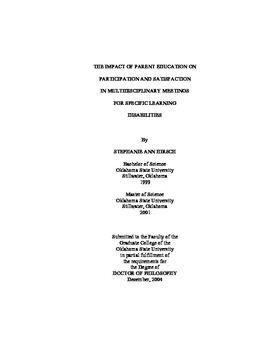| dc.contributor.advisor | Stinnett, Terry | |
| dc.contributor.author | Hirsch, Stephanie Ann | |
| dc.date.accessioned | 2013-11-26T08:34:33Z | |
| dc.date.available | 2013-11-26T08:34:33Z | |
| dc.date.issued | 2004-12 | |
| dc.identifier.uri | https://hdl.handle.net/11244/7433 | |
| dc.description.abstract | Scope and Method of Study: Parents are increasingly being seen as partners in special education and initiatives to increase parent participation have been enacted under Public Law 94- 142 and currently the Individuals with Disabilities Education Act. Parents are viewed as valuable members of the multidisciplinary team that makes eligibility and IEP planning decisions. The most common referral that leads to a formal evaluation and special education classification is that of students displaying academic difficulty. This study investigated parental factors that were present during a Specific Learning Disability classification meeting. The study examined whether increased training and knowledge resulted in enhanced outcomes for students; increased parent satisfaction with the classification process and interaction with other team members; and whether increased information provided to parents increased the amount and quality of their participation in the process. Participants included parents of children who were suspected of having a Specific Learning Disability (SLD). Participants were randomly assigned to three conditions. These conditions consisted of education, attention, and control. The SLD informational packet was compiled to educate parents. The Knowledge Attainment & Satisfaction Questionnaire, Parent Verbalization Coding Form, Satisfaction and Perception Questionnaire, and School Personnel Questionnaire were researcher-developed measures that were used. | |
| dc.description.abstract | Findings and Contributions: The results of this study indicated that parent training was an effective method for informing parents about learning disabilities and the special education process, and helping them become active multidisciplinary team members. Parent training increased the amount of quality participation during multidisciplinary meetings. This training also increased the amount of perceived quality parent participation by parents and regular education teachers. Parents also showed increased amounts of knowledge about learning disabilities and special education procedures. Parent satisfaction was not largely effected by participating in parent training. | |
| dc.format | application/pdf | |
| dc.language | en_US | |
| dc.rights | Copyright is held by the author who has granted the Oklahoma State University Library the non-exclusive right to share this material in its institutional repository. Contact Digital Library Services at lib-dls@okstate.edu or 405-744-9161 for the permission policy on the use, reproduction or distribution of this material. | |
| dc.title | Impact of parent education on participation and satisfaction in multidisciplinary meetings for specific learning disabilities | |
| dc.contributor.committeeMember | Oehler-Stinnett, Judy | |
| dc.contributor.committeeMember | Duhon, Gary | |
| dc.contributor.committeeMember | Harrist, Steve | |
| dc.contributor.committeeMember | Davis, Robert | |
| osu.filename | Hirsch_okstate_0664D_1117.pdf | |
| osu.accesstype | Open Access | |
| dc.type.genre | Dissertation | |
| dc.type.material | Text | |
| dc.subject.keywords | parent education | |
| dc.subject.keywords | multidisciplinary meetings | |
| dc.subject.keywords | learning disabilities | |
| thesis.degree.discipline | School Psychology | |
| thesis.degree.grantor | Oklahoma State University | |
